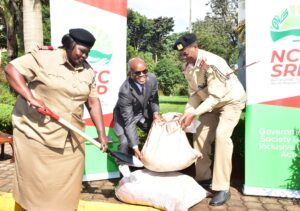
The symbiotic relationship between the Micro, Small, and Medium Enterprises (MSMEs) and the e-commerce sector in Kenya is a powerful force in driving economic growth. This emerged during a recent stakeholder forum called to review the Kenya E-commerce Strategy that was launched in December 2023.
While appreciating the role of small businesses in opening up income opportunities and supporting the economy, the ambitious Kenya E-commerce Strategy’s vision is to foster innovation, inclusive participation, and economic growth through digital commerce for all Kenyans regardless of location, age, gender, or abilities.
The Kenya MSME sector remains a vibrant landscape that boasts over 7.4 million MSMEs, mainly young entrepreneurs. Spanning various sectors, from farming and agribusiness to logistics, general trade, merchandising, and even services, they collectively contribute about 40 percent of the country’s Gross Domestic Product.
Looking to empower and partner with MSMEs, which play a crucial role in sustaining local economies across the country, BrighterMonday Kenya launched the e-Biz Kwa Vijana program in May 2023, a ground-breaking e-commerce development initiative to train 1,000 MSMEs in E-commerce and digital marketing skills.
After one year the program also intended to support and on-board 600 MSMEs onto e-commerce platforms, concluded in June 2024 having imparted e-commerce and digital marketing skills to over 2,000 beneficiaries while successfully on-boarding 632 onto online trading platforms.
Through the training in digital strategies, I can now develop my own online advertisements and product promotions on social media. Before I joined the e-Biz Kwa Vijana program, I did everything manually including data entry, and sourced for customers through direct selling and personal interactions. Now, I am well equipped to position my brand, products, and services online, to reach millions of potential customers all over the country”, said Victor Waliaula, a budding entrepreneur and proprietor of Jenkins Computer Solutions, based in Nairobi.
According to Waliaula, a university graduate in information and communication technologies his business has since seen a 30 percent rise in revenues and he is not looking back, keen to harness even more training in business strategy and marketing to help grow his business.
Funded by USAID through the e-Trade Alliance, E-Biz Kwa Vijana, also covered women entrepreneurs and people with disabilities. According to Chris Otundo, the Chief Executive Officer of BrighterMonday Kenya, the E-Biz Kwa Vijana program represents the firm’s commitment to bridging the talent gap in Africa while helping to unlock opportunities for economic empowerment of young entrepreneurs and MSMEs.
“The success of this program indicates the strong entrepreneurial spirit in young people in Kenya today. We recognize and acknowledge the potential of E-Commerce to help revolutionize the local entrepreneurial landscape by equipping young people like Victor and Lilian with the necessary knowledge and tools to expand their market opportunities”, said Otundo.
Lilian Wairimu, Co-Director, Jegos Enterprises, also an E-Biz Kwa Vijana beneficiary explained how she has witnessed a 50 percent rise in sales revenues over the last year, thanks to having an online presence with a growing customer base on social media platforms including Instagram, TikTok and Facebook.
“I happened to enroll in the e-Biz Kwa Vijana program right in the nick of time. Previously, I would just sit in my shop waiting for walk-in customers and relying on corporate or government tenders for opportunities which I admit are very hard to come by because of their many requirements such as huge working capital reserves which in some cases were out of our reach being an MSME”, she said.
According to Michael Mandu, the Acting Secretary for Trade in the State Department for Trade, Kenya has witnessed a steady growth of E-Commerce in recent years and is currently established as a leader in digital trade within the African continent and globally with combined revenues in the sector projected to grow to USD2,928.00 bn in 2023.
“A large share of this revenue is attributable to MSMEs, and youth-run enterprises, that provide jobs and sustainable livelihoods while also nurturing digital talents in the country. The Kenya National E-commerce Strategy is therefore not just a policy document but a testament to our commitment to creating an environment where businesses can thrive, where entrepreneurs can innovate, and where every citizen can participate in the digital economy”, said Mandu.
Following the E-Biz Kwa Vijana Program, 95 percent of the MSMEs said they gained new ideas for their online businesses, with 86 percent achieving their first-ever online sale after the training. 61 persons with disabilities received business coaching with 15 getting on-boarded onto different E-Commerce platforms.
Additionally, 28 percent reported an increase in the number of employees to help support increased online business activities while another 95 percent of participants were willing to set aside a monthly E-Commerce expense after determining the return on investment.
With the internet penetration rate currently above 74 percent, the country finds itself in an ideal environment for e-commerce growth. The growing middle class who make up a greater percentage of E-commerce customers rely on this convenience and speed, allowing them to shop from the comfort of their homes.
With market access widely enabled through connectivity many budding entrepreneurs like Victor and Lillian, can now boast of a broader customer base and new markets through E-commerce which opens up a world of limitless potential for expansion and growth in the local and global economy.













